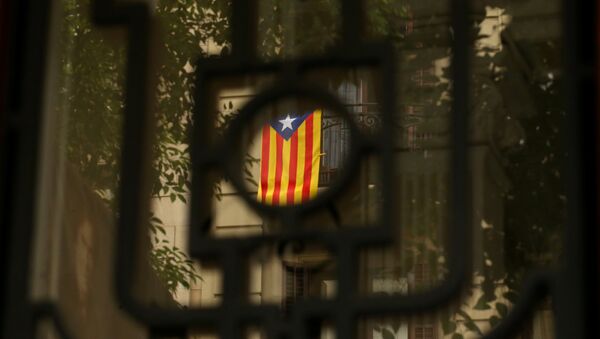When asked what will happen to Spain's state structure if the referendum on Catalonia's independence takes place on October 1, Spanish political commentator Jose Luis Carretero Miramar cited a wait-and-see approach to the matter.
"First, let's see if the government will give the go-ahead to the referendum or if it will try to prevent the event by using security services or resorting to other methods," Miramar said, not ruling out the possibility of police interference.
He predicted that if the referendum occurs, the "Declaration of Catalonia's independence" may be made public already on October 4.
"In this case, we will see; on the one hand, the Spanish government trying to resort to repressive methods and legitimizing them; we will see the government referring to the fact that the referendum law is out of line with the Spanish Constitution and applying to the Constitutional Court," Miramar said.
If voters say "no" to Catalonia's independence, it will put a stop to the struggle for independence that recently started in Catalonia, so this scenario will mean the formation of new self-governing bodies there, according to Miramar.
"I think the main question is to what extent the Spanish government is ready to openly use repressive measures, and to what extent it will increase pressure and 'physically' prohibit the referendum," he said.
Also, many wonder "to what extent the government of Catalonia can count on any support from other countries," Miramar added.
Touching upon a number of problems that independent Catalonia could face, he said that the nascent nation would first have to deal with finding itself outside the EU.
"This does not mean that there is no possibility of holding further negotiations on Catalonia's re-joining the EU, which could begin even immediately after the recognition of Catalonia's independence at the international level," Miramar said.
According to him, this could in turn lead to a situation where Spain would block Catalonia's efforts to re-enter the EU.
"I think that the main problem is whether other countries, apart from the Baltic States, will officially recognize Catalonia as a sovereign state, which will in turn prompt a dialogue about Catalonia's re-access to the EU," Miramar concluded.
#Catalonia defies Madrid and goes for independence poll https://t.co/aE829gAP6P pic.twitter.com/wY8bSjVa3c
— euronews (@euronews) 7 сентября 2017 г.
Catalonia's parliament voted late Thursday in favor of a law on transition to independence that regulates the region's exit from Spain, the parliamentary speaker said. The legislation was backed by 71 lawmakers, with ten votes against and no abstentions.
Spain's constitutional court has suspended Catalonia's independence vote https://t.co/w7zQcLvk9O
— TIME (@TIME) 8 сентября 2017 г.
The transition law will come into being the day after people in the wealthy Mediterranean region in Spain's northeast vote in favor of leaving.
It will stay in force for about six months to allow for a new parliament to take over. The legislature will then draft the constitution of an independent Catalonia.
The vote was, however, ruled unconstitutional by the Spanish government and the Spanish Constitutional Court.
In early June, the president of the autonomous region, Carles Puigdemont, said that Catalonia would hold a referendum on independence from Spain on October 1, 2017, prompting criticism from Madrid.




